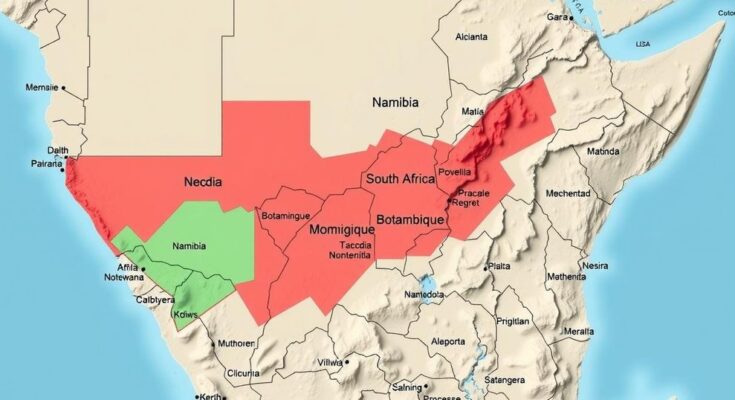The 2024 elections in Southern Africa, particularly in South Africa, Mozambique, Botswana, and Namibia, underscore a growing demand for political renewal. Significant changes include the ANC forming a coalition in South Africa, the UDC claiming a majority in Botswana, and ongoing unrest in Mozambique against Frelimo’s leadership. Namibia’s SWAPO, while retaining power, faces criticisms, indicating varying local dynamics in the region’s quest for responsive governance, economic stability, and social justice.
The 2024 election results across several Southern African nations, particularly South Africa, Mozambique, Botswana, and Namibia, have brought the theme of political renewal to the forefront. Each country’s circumstances are distinct, challenging the simplistic narrative of an overarching “wind of change.” For instance, South Africa witnessed the African National Congress (ANC) lose its parliamentary majority for the first time, paving the way for a coalition government. Such political shifts could signal a transformative period for a region mostly governed by former liberation movements, implying a potential transition into a post-liberation political landscape.
In Botswana, a pivotal election saw the opposition party, Umbrella for Democratic Change (UDC), win a majority, marking a critical shift after nearly sixty years of the Botswana Democratic Party (BDP) governance. Duma Boko, the opposition leader, emphasized the importance of this peaceful transition in advancing democracy. Despite its impressive economic history, Botswana has faced rising unemployment and growing social disparities, prompting voters to demand change.
In Mozambique, the ruling Frelimo party faced significant dissent from sections of society disillusioned by stagnant economic conditions. The perceived lack of response to citizens’ economic grievances has led to calls for greater accountability and transparency. These sentiments are echoed in ongoing protests demanding electoral reform and justice in governance, showcasing a burgeoning call for political and social renewal.
Namibia’s November elections displayed a different trend, as the ruling party, the South West Africa People’s Organisation (SWAPO), retained power, albeit amidst criticisms regarding electoral transparency. The candidacy of woman Netumbo Nandi-Ndaitwah introduced a novel element within the party’s traditional framework, yet the substantial status quo continues, indicating a pervasive electoral fatigue with existing ruling parties across the region.
Ultimately, the election outcomes signal a growing desire for change among voters in Southern Africa. Former liberation movements that once garnered overwhelming support now face increasing pressure to address pressing socio-economic challenges, such as unemployment and corruption. As these movements grapple with a younger, urban electorate less swayed by historical narratives, their ability to adapt will determine their future viability in the region’s rapidly evolving political landscape.
The political landscape in Southern Africa is undergoing significant transformations as evidenced by the results of the 2024 elections in countries such as South Africa, Mozambique, Botswana, and Namibia. Historically dominated by former liberation movements, the region is now witnessing shifts in power dynamics and increasing demands for political change, particularly from younger and urban populations. The long-established parties that have maintained control face discontent arising from unmet socio-economic needs, unrest among the populace, and calls for new leadership. These elections not only reflect a desire for political renewal but also highlight a growing sense of urgency among voters to hold their leaders accountable.
In summary, the recent electoral developments in Southern Africa reveal a complex interplay of continuity and change across different nations. While South Africa and Botswana are seeing significant political shifts signaling the need for renewed governance, Mozambique continues to grapple with calls for stability amidst discontent. Namibia’s reaffirmation of SWAPO’s power underscores the struggles many established parties face as they confront an increasingly critical electorate demanding accountability and effective solutions to pressing socio-economic issues. The overarching narrative suggests that traditional liberation movements must adapt and respond to contemporary challenges or risk being further sidelined in the evolving political discourse.
Original Source: www.fairobserver.com




